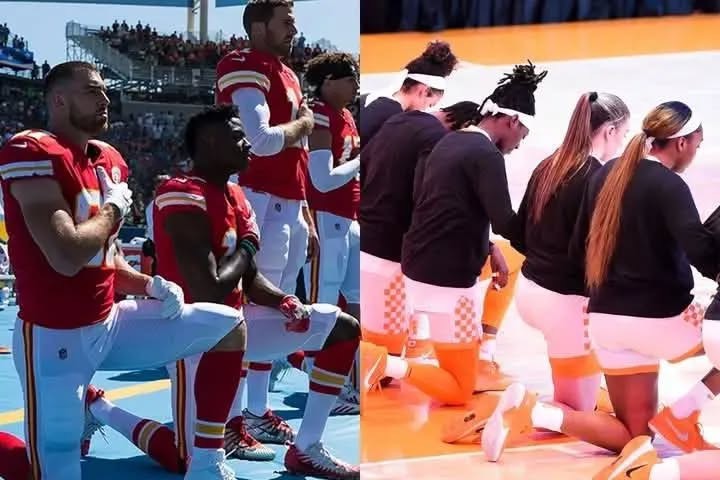NFL
Shocking Decision: Ten College Athletes Lose Scholarships for Kneeling During National Anthem—Is This Fair? Read more

In a decision that has sparked nationwide debate, ten college students recently lost their athletic scholarships after kneeling during the national anthem at a major sporting event. This incident has reignited the ongoing controversy surrounding protest actions during the anthem, with opinions deeply divided over the consequences of such demonstrations.
The event in question took place at a significant college football game, where the athletes knelt during the national anthem to protest what they described as social injustice and racial inequality. Their actions, intended as a peaceful protest, immediately attracted the attention of the media, spectators, and, most importantly, their college administration.
Within days, the college announced that the scholarships of the ten students involved in the protest were being revoked. The administration cited a breach of the college’s code of conduct, which emphasizes respect for the national anthem as a symbol of unity and national pride. The decision was swift and decisive, sending a clear message to the student body and the public.
As news of the revoked scholarships spread, so did opinions on the matter. Supporters of the college’s decision argue that the students’ actions were inappropriate for the setting and that their role as student-athletes comes with a responsibility to represent their institution and country respectfully.
These students are here on scholarships to play sports and get an education, not to make political statements,” said a spokesperson for the college. “Kneeling during the anthem disrespects our flag, our veterans, and the values that this country stands for.”
Critics of the decision, however, have been vocal in their condemnation. They argue that the students were exercising their First Amendment rights and that punishing them for a peaceful protest is a violation of those rights. Many have pointed out the historical significance of protest in advancing social change and have expressed concern over the implications of penalizing such actions.
“The right to protest is fundamental to our democracy,” said a civil rights attorney who has offered to represent the students. “Punishing these young people for expressing their beliefs sends a chilling message to others who wish to speak out against injustice.”
For the students involved, the loss of their scholarships has had immediate and severe consequences. Most relied on their scholarships to afford their education, and without financial assistance, their future at the college is uncertain. Some have expressed feelings of betrayal, believing their institution should support their right to free expression rather than punish them for it.
One of the students, who wished to remain anonymous, spoke to the media about the experience. “We were standing up—or kneeling down—for what we believe in,” they said. “We didn’t think we would be punished so harshly for it. Now we’re wondering if we can even stay in school.”
The college has faced backlash for the decision, with protests erupting on campus and online. Students, alumni, and members of the broader community have organized demonstrations and social media campaigns to support the athletes and call for the reinstatement of their scholarships.
The revocation of the scholarships has sparked a broader conversation about the role of protest in sports and education. The debate touches on the intersection of free speech, respect for national symbols, and the responsibilities of student-athletes.Supporters of the college’s decision argue that there is a time and place for protest, and that a sporting event, where athletes represent their school and country, is not the appropriate venue. They believe that the national anthem should be a moment of unity and respect, not division.
Opponents, on the other hand, argue that protest has historically been a powerful tool for change and that students should not be penalized for speaking out on issues that matter to them. They point out that sports have often been a platform for social activism, from Muhammad Ali to Colin Kaepernick, and that these actions can raise awareness and inspire change
The legal implications of the college’s decision are also being debated. While private institutions have more leeway in setting their own rules, public colleges are bound by the First Amendment, which protects free speech. Some legal experts have suggested that if the college is a public institution, the decision to revoke scholarships could be challenged in court as a violation of the students’ constitutional rights.
“The First Amendment protects students from being punished for their speech, especially in a public college setting,” said a constitutional law professor. “If this case goes to court, the college may have to justify its actions under a very high legal standard.”
As the debate continues, the students involved are left to navigate the uncertain waters of their educational and athletic careers. Some have expressed a desire to transfer to other institutions that may be more supportive of their activism, while others are hoping for a resolution that allows them to continue their education at their current college.
The college administration has remained firm in its decision, but there are signs that the pressure from protests and media attention may lead to further discussions. Some have suggested that a compromise could be reached, such as reinstating the scholarships with conditions or allowing the students to reapply.
The case of the ten students who lost their scholarships for kneeling during the national anthem is a microcosm of the larger national debate about the role of protest in sports, education, and society. It raises important questions about free speech, respect for national symbols, and the responsibilities of student-athletes.
As this story continues to unfold, it is clear that the issues at its core are far from resolved. The actions of these students and the response from their college will likely be remembered as part of the ongoing dialogue about the rights and responsibilities of Americans in a divided and complex society.












